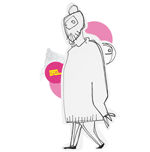
GENDER OF NOUNS
In Spanish there are only two genders; the nouns are either male or female. For example:
Nouns ending in - o are usually masculin. Few nouns ending in -o are feminin: la mano (the hand) , la radio (the radio) , la foto (the picture ). Nouns ending in -a are usually feminin. Some nouns ending in -a are masculin: el día (the day), el mapa (the map) , el poeta (the poet) , el problema (the problem) , el tema (the topic). Nouns ending in -ema, -oma, -uma are masculin: el idioma (the language), el tema (the topic) , el problema (the problem), el telegrama (the telegram), el programa, el fantasma, el reuma, el clima, el sistema. Nouns ending in -e oder consonant can be masculin or feminin. Nouns ending in - dad, -ción, sión, -ez, are feminin: la nacionalidad (the nationality), la información (the information), la decisión (the decison) , la validez (validity). Nouns ending in -aje, -an, -ón, -or are usually masculin : el reportaje (the reportage) , el plan (the plan) , el corazón (the heart), el color (the color). Job titles which ended in -ista or -nt have mostly just a form for both sexes: el/la periodista (the journalist), el/la representante (the representant), el/la estudiante (the studen ) The masculine names which end in consonant, add an - a in their feminin form: director/la director (the director) , el señor / la señora (mister / miss), el francés/la francesa (the french man / the french woman ) The letters are feminin: ñ is a Spanish letter Numbers are masculin. For example: The seven are my number of the luck . Some nouns have different meanings, according to whether they are male or female: el capital (the capital ) – la capital (the capital), el frente (the front) - la frente (the forehead), el cura (the priest) - le la cura (the remedy), el cometa (the comet) - la cometa (the kite).
|
|---|
gender of nouns
|

